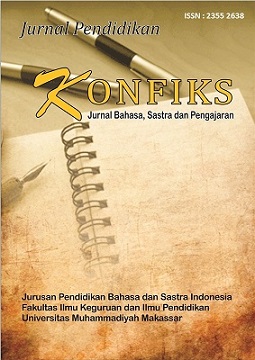PREPARING INDONESIAN LANGUAGE TEACHERS AS PROFESSIONALS IN THE 5.0 ERA: IMPROVING COMPETENCE THROUGH TRAINING AND SUSTAINABLE DEVELOPMENT
DOI: https://doi.org/10.26618/akzb8783
Pengembangan Guru Bahasa Indonesia, Kompetensi Digital Kontekstual, Society 5.0, Refleksi Profesional
Abstract
The Society 5.0 era demands an educational transformation that places Indonesian language teachers as strategic actors in creating an adaptive, reflective, and technology-based learning ecosystem. In this context, teacher competency development is no longer focused solely on technical skills, but must include digital literacy, pedagogical agency, and scientific engagement. This study aims to explore and synthesize various models of Indonesian language teacher competency development based on five main scientific articles relevant to the Society 5.0 era. The method used is a literature study with a qualitative descriptive approach. Data were analyzed using thematic matrix-based content techniques through the stages of data reduction, data presentation, and verification. The results of the study identified five dominant models: (1) Adaptive Professionalism Model (Tran Minh), (2) Contextual Digital Competency Model (Grisma et al.), (3) Sustainable Digital Transformation Model (Vorotnykova), (4) Reflective and Collaborative Agency Model (Averina & Kuswandono), and (5) Academic Engagement-Based Development Model (Tias & Tongjean). Each model has contextual advantages, but has not fully answered the complexity of the challenges of the Society 5.0 era in an integrated manner. Therefore, a hybrid approach that integrates the strengths of the five models is recommended as the most effective strategy. Recommendations include: context-based training in the field, strengthening professional reflection, utilizing adaptive technology, and ongoing institutional support. These findings contribute to research on strategies for developing Indonesian language teacher competencies that are more relevant, holistic, and applicable in facing the digital-humanistic era of Society 5.0.
References
Averina, F. E., & Kuswandono, P. (2023). Professional development of Indonesian in-service EFL teachers: Perceived impacts and challenges. Englisia: Journal of Language, Education, and Humanities, 10(2), 71. https://doi.org/10.22373/ej.v10i2.15589
Benjamin, Nyanda, D. K. L. D. (2025). Technology Integration in Classrooms: Evaluating Teachers’ Perceptions of Administrative Support in Tanzanian and Indian Schools. International Journal For Multidisciplinary Research, 7(1). https://doi.org/10.36948/ijfmr.2025.v07i01.35420
Dinçer, S. (2024). Bridging the gap in technology integration in education: An examination of science teachers’ competencies and needs. Journal of Turkish Science Education, 21(4), 620–634. https://doi.org/10.36681/tused.2024.033
Fadli, M. R. (2021). Memahami desain metode penelitian kualitatif. HUMANIKA, 21(1). https://doi.org/10.21831/hum.v21i1.38075
Gaur, V. (2025). Teacher training in lifelong learning—the importance of digital competence in the encouragement of teaching innovation. The Business and Management Review, 15(03). https://doi.org/10.24052/BMR/V15NU03/ART-24
Grisma Yuli Arta, Wendrizal Wendrizal, & Aulia Almeyda. (2024). Meningkatkan Kopetensi Guru Bahasa Indonesia Melalui Program Pengembangan Profesional. Perspektif : Jurnal Pendidikan Dan Ilmu Bahasa, 2(3), 85–98. https://doi.org/10.59059/perspektif.v2i3.1457
Huberman, A., & Miles, M. (2012). The Qualitative Researcher’s Companion. In The Qualitative Researcher’s Companion. https://doi.org/10.4135/9781412986274
Ickes, S. B., Craig, C., & Heidkamp, R. A. (2020). How do nutrition professionals working in low‐income countries perceive and prioritize actions to prevent wasting? A mixed‐methods study. Maternal & Child Nutrition, 16(4). https://doi.org/10.1111/mcn.13035
Marantika, J., & Tomasouw, J. (2024). Paradigma Baru Pendidikan dan Perkembangannya di Era Society 5.0. German Für Gesellschaft (J-Gefüge), 3(1), 7–12. https://doi.org/10.30598/jgefuege.3.1.7-12
Minh, N. T. T. (2024). Teacher Professional Development in Education 5.0 (pp. 175–204). https://doi.org/10.4018/979-8-3693-3041-8.ch011
Miszkiewicz, K. (2024). Jak technologie zmieniają rolę nauczyciela? Języki Obce w Szkole, 4(2024), 39–45. https://doi.org/10.47050/jows.2024.4.39-45
Napitupulu, M. H., Muddin, A., Bagiya, B., Diana, S., & Rosyidah, N. S. (2024). Teacher Professional Development in the Digital Age: Strategies for Integrating Technology and Pedagogy. Global International Journal of Innovative Research, 2(10), 2382–2396. https://doi.org/10.59613/global.v2i10.334
Riyanda, A. R., Parma Dewi, I., Jalinus, N., Ahyanuardi, Sagala, M. K., Rinaldi, D., Prasetya, R. A., & Yanti, F. (2025). Digital Skills and Technology Integration Challenges in Vocational High School Teacher Learning. Data and Metadata, 4, 553. https://doi.org/10.56294/dm2025553
Sabharwal, D., & Mitra, A. (2024). Impact of AI on Student Learning and Teacher Outcomes in Education 5.0 (pp. 293–316). https://doi.org/10.4018/979-8-3693-8191-5.ch012
Sajid, L., Sultan, S., & Ahmed, S. Z. (2024). Evaluating the Effectiveness of Practicum in Teachers’ Training Programs in Perspective of Technology. Academy of Education and Social Sciences Review, 4(4), 544–553. https://doi.org/10.48112/aessr.v4i4.945
Schleicher, A. (2020). TALIS 2018 Results. Teachers and School Leaders as Valued Professionals, II. https://doi.org/10.1787/5f07c754-en
Tias, S. A., & Tongjean, W. (2022). Teacher professional development in Indonesia: A comparative study with global practices. In Innovation on Education and Social Sciences (pp. 89–95). Routledge. https://doi.org/10.1201/9781003265061-12
Vorotnykova, I. P. (2024). Professional development of teachers in conditions of digital transformation of postgraduate pedagogical education.
Downloads
Published
Issue
Section
License
Copyright (c) 2025 JURNAL KONFIKS

This work is licensed under a Creative Commons Attribution 4.0 International License.
Authors who publish with this journal agree to the following terms:
The author owns the copyright and grants the journal rights for first publication with the work simultaneously licensed under a Creative Commons Attribution License which allows others to share the work with acknowledgment of the work's authorship and initial publication in this journal.
Authors may enter into separate additional contractual agreements for the non-exclusive distribution of the published journal version of the work (for example, posting it to an institutional repository or publishing it in a book), with acknowledgment of its initial publication in this journal.
Authors are permitted and encouraged to post their work online (for example, in institutional repositories or on their websites) before and during the submission process, as this can lead to productive exchanges, as well as earlier and larger citations of published work (See The Effect of Open Access).
Statement of Authenticity and Manuscript Copyright can be downloaded: Here
After filling in the statement letter, please send via e-mail: konfiks@unismuh.ac.id





.png)


